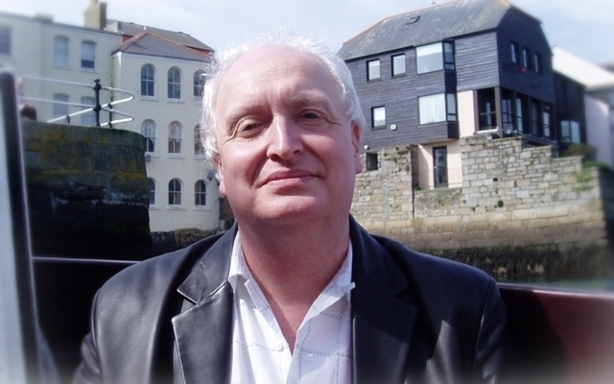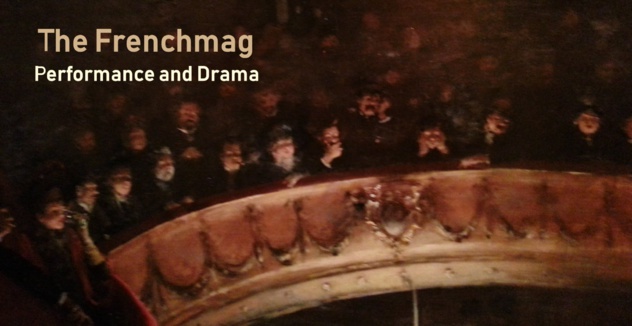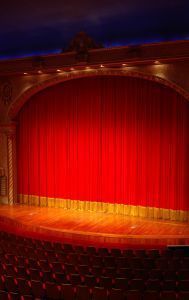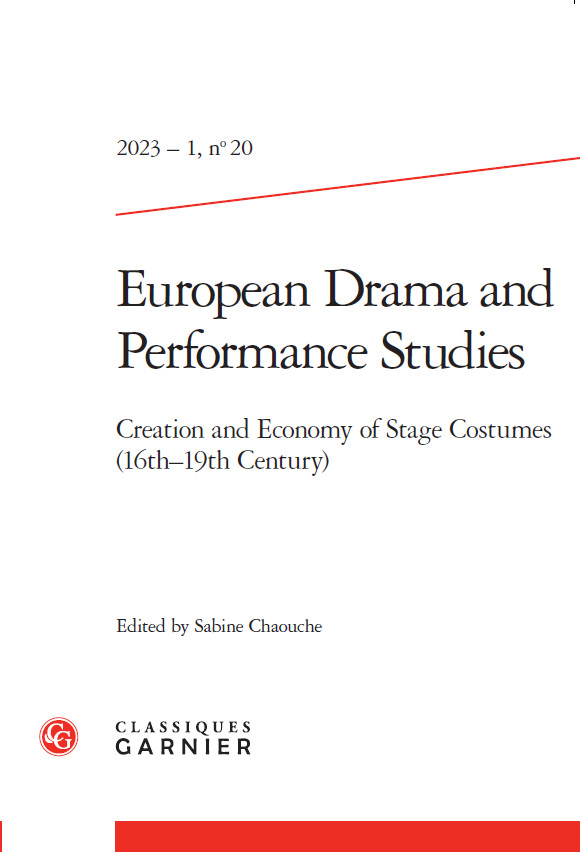
(c) Professor Derek Connon
.
1. You depict yourself as a « dix-huitiémiste ». Could you explain the way in which you decided to specialize in French studies? And why did you decide to focus on the Enlightenment period and especially theatre?
This goes a long way back. I took to French as soon as I started classes at secondary school, and from then on a future in French was decided. I did waver a bit when I discovered how much I enjoyed English Literature at A-level and wondered if that was the way forward, but then realized that the study of French literature was the way to combine the language and literature strands, and I sought out a course that allowed me to do as much literature as possible. I still remember my first introduction to Diderot: I was listening to the radio in the bath in my digs when I was a first-year undergraduate and on came a dramatization of Le Neveu de Rameau. The bath water got colder and colder, but I was completely riveted, and didn’t want to break the spell by getting out. I was similarly fascinated by a staging of the Supplément au ‘Voyage de Bougainville’ that was put on in Liverpool when I was in my second year. So it was, I suppose, a happy accident that Richard Waller – who went on to be my PhD supervisor – was offering a final-year option on Diderot, and when it came to choosing a research topic the progression was pretty natural – although I admit that I did toy with the idea of joining the Proust industry, Diderot won out. As for choosing to work on his theatre – it was then, and perhaps still is to an extent, a relatively neglected area, and, as I’ve always been an amateur actor, it was a natural area for me to take an interest in.
2. You published a critical edition of plays relating to the fairground theatres (co-ed. With George Evans) fifteen years ago. You were amongst the first researchers who explored this particular theatre. Do you consider that research on the fairgrounds developed enough in the UK?
It was very much George who inspired my interest in fair theatre, which he had come to because of research on Lesage. It really struck a chord with me because of my interest in, or perhaps obsession with, music, and I was also delighted from the outset to be able to make the most of the connection with Piron – of all the plays I read by authors other than Diderot when I was writing my PhD, La Métromanie had stood out as one of the most fascinating, and Arlequin-Deucalion also proved a real find when I later came across it. As you say, this repertoire was not particularly well known when I first started researching it, but I think drama specialists are now a lot more aware of it, and I’m particularly pleased at how much people seem to have enjoyed the Piron plays I’ve edited, because, in my view, he is probably the best of the fair writers, but the fact that he is virtually absent from the Lesage and d’Orneval anthology has made his work in the field even slower to catch on than that of the authors who are in that anthology. I suppose one disappointment is that the oddity of the form and the complexity of the historical reasons behind it can make it a bit difficult to sell to undergraduates, but there will always be some who can make a connection with it. I’ve sometimes given lectures on the music where I play the examples on the violin and even do a bit of singing, which tends to leave audiences reasonably startled.
3. You are also interested in performance and practice. Could you describe the type of productions that you staged and directed? Did you try to “reconstruct” early modern acting and staging? How did you research inform your practice?
My directing arose from a very fertile drama scene when I was an undergraduate at Liverpool – I had always acted at school, so, of course, got involved in the plays from the outset, but was then asked to step in to fill the director’s role when I was a postgraduate. I suppose the fact that I went straight to eighteenth-century theatre was unsurprising – I chose Les Fausses Confidences, and it seemed to make a good impression. It was only later that I came to realize how difficult Marivaux is to direct – a real case of a fool rushing in. But I did a range of things after that, from Molière to Apollinaire and Vitrac, including a dramatized version of Diderot’s dialogue Mystification – harking back, I suppose to the huge impression made by those other dramatizations of Diderot texts not originally intended for the theatre that had fired my imagination. There was a bit of wish-fulfilment there too, as I played the part of Diderot myself – some people even said there was a physical resemblance! I’ve always had at the back of my mind considerations of period – not just acting style and the practicalities of the theatre, but also the way that people thought and how the practicalities of day-to-day life affected what they chose to depict on stage. But I’ve never sought to reproduce contemporary performance practice – quite the opposite, in fact: my concern has always been how to make what I perceive to be the point of the play accessible to a modern audience, and so, from that point of view, I’ve been happy to use things like modern dress where they seemed helpful. I don’t believe in doing ‘clever’ things for their own sake – only in the service of the author – although I dare say it doesn’t always look that way to others…
4. What are your current projects? Do they lie with the early modern period?

I’m back with Piron, working on an edition of Gustave Wasa – having done my bit for the comedies in other editions, I felt it was time to introduce the tragedies to a wider audience. I also have on the back burner, though, a project on Cocteau’s theatre. I’ve never limited my research or teaching to the eighteenth century, and I do find Cocteau a fascinating and under-rated figure – I’ve taught plays and films of his for a number of years, and am currently challenging (I think that’s the word) students with lectures on his involvement with the Ballets russes and Les Six.
5. What are your strengths and the strengths of UK researchers in general (e.g. method, rigour, originality…)?
I suppose not everything one writes can be entirely original, but I would like to think that I have said some new things about familiar works and have introduced some lesser known ones to wider audiences. I think precision and thoroughness are generally features of British scholarship, which, again, I’d like to think I share. I know I have an obsession with detail – you have to have to be an editor, but it goes back a lot further than my work on the Modern Language Review; a colleague once suggested to me that I was perhaps going too far in basing a whole article (on Sartre’s Morts sans sépulture and Tosca) on a single sentence, and I had to point out that it was really based on a single word…
6. Could you explain your work at the MHRA?
This began when I responded to an announcement on Francofil seeking a new editor for the French section of the Modern Language Review in 2005, and I took over the job in 2006 – I should have edited the January issue, but, as it happened, there was an article of mine in the pipeline coming out that month, so my first issue was for April. As well as looking after the articles for the section, the editor also deals with reviews, so one of the challenges is finding both readers for articles and reviewers. People are usually very willing to give up their time to read submissions, which I’m very grateful for: without this the whole system would break down. Reviewing can be a little more tricky, since reviews do not count in the various research assessment exercises, and so people have to protect their research time, but there are a lot of colleagues who are keen to help and genuinely interested in reading new work. My office is in a permanent state of chaos with the various piles of review copies. Obviously the editing demands a certain sort of meticulous attention to detail, but it is always rewarding when authors let you know that it has been helpful to them. It is interesting work, and you get to know a lot of people by correspondence. The downside is writing rejection letters – by a long way the least pleasant part of the job. The MHRA itself is an interesting organization, doing a lot of good work not just in publishing, but in supporting scholars in other ways too – all committee members are trustees of the charity, and take their work very seriously.
7. Your Department faced recently restructuring. Could you talk about this (how does it go now)?
As anyone who followed the campaign will remember, we were very fortunate in having been able, with the support of the university’s Council, to get over the message that sections could not function with the staffing levels proposed. Both the Welsh and the British governments have continued to stress the importance of Modern Languages, and this has helped us. Obviously the general economic situation, not to mention the question of university funding, means that this is a difficult time for universities generally, and the decline in the number of students doing Modern Languages at A-level puts Modern Linguists in a particularly vulnerable position, so it is difficult for any of us to talk about the future with a great deal of confidence, but, with that in mind, things seem all right for the moment. Mind you, it is the sort of experience which inevitably changes your attitude to the job quite significantly.
8. How do you see the future and the place of Modern Languages in Great Britain?
There is no doubt that we are going through a difficult period, but it is a difficult period that seems to have lasted as long as my career, and we are still here. I think our main problem lies less in the fact that that the dominance of English as a world language has made the British even more convinced than ever that there is no need to bother with other languages – that has always been a British trait, but there have still been lots of people interested in foreign languages and cultures – and more in the fact that in schools GCSE and A-level in Modern Languages are seen as being difficult options – and I’m sure that in comparison with some other subjects they are, which is a huge disincentive for students who might otherwise choose to study them. And the upshot is that, with fewer and fewer students taking them, the number of languages has been reduced in many schools; at least French specialists are lucky that French is the one that tends to survive. But the problems inherent in our being a nation that neglects foreign languages have now been accepted at government level, and so there are real possibilities that the future will see an improvement. In the meantime, we have to keep on fighting for the future of our subject, or there is a real possibility that it will end up being taught in just a small number of institutions.
9. It seems to me that French Theatre specialists and especially early modernists, or conference on early modern theatre are not very much “visible” in the UK (cf. for instance to Francofil announcements). Do you think that research areas such as Globalization, World Literature / Francophonie, French Films will dethrone French Early Modern / Theatre Studies in the UK?
In smaller departments this has already happened to an extent. We are no longer in a position to tell students what is best for them because, if they don’t like it, they will simply not come to us. In larger departments where there is scope for more modules there will always be enough students interested in our subjects for colleagues to be able to run modules in them. In a smaller department like mine, we just have to ensure that we design the sort of modules that allow us to keep a presence for what we want to teach. Because, of course, the reason we want to teach it is because we think it is worth knowing about, and there will always be some students who agree with us.
10. How could lecturers show students that studying the early modern period is not “boring”? What would you recommend?
First and foremost communicate your own enjoyment. Show them too that the authors were real people with real concerns whose works can still speak to us directly. It is important to show what they had in common with us, because that forms a bond, but also to show how they and their world were different, because that is where a lot of the interest in studying older texts lies.
Interview by Sabine Chaouche
Interview by Sabine Chaouche
Chinese Profile
If you were:
A character from the fairground theatres:
I’d like to think I was one of those sensible characters like Dom Pèdre in Piron’s Robe de dissension.
A sentence by Diderot:
Mes pensées ce sont mes catins.
A piece of music:
Stravinsky’s Dumbarton Oaks – clearly a product of the twentieth century, but with distinct eighteenth-century influences
An instrument (apart from viola and violin):
Could I be an orchestra? Shame to leave anything out…
A friend of Piron:
Rameau
A C19 Author:
Stendhal
A C20 scenery:
The view up the Tyne from the quayside in Newcastle – still a Geordie at heart
A play to be edited:
Le Philosophe marié trying to find the work/life balance
A C18 painting or engraving:
A Chardin still life – a glorious combination of art and usefulness
A character from the fairground theatres:
I’d like to think I was one of those sensible characters like Dom Pèdre in Piron’s Robe de dissension.
A sentence by Diderot:
Mes pensées ce sont mes catins.
A piece of music:
Stravinsky’s Dumbarton Oaks – clearly a product of the twentieth century, but with distinct eighteenth-century influences
An instrument (apart from viola and violin):
Could I be an orchestra? Shame to leave anything out…
A friend of Piron:
Rameau
A C19 Author:
Stendhal
A C20 scenery:
The view up the Tyne from the quayside in Newcastle – still a Geordie at heart
A play to be edited:
Le Philosophe marié trying to find the work/life balance
A C18 painting or engraving:
A Chardin still life – a glorious combination of art and usefulness
Bibliography
Books
Innovation and Renewal: A Study of the Theatrical Works of Diderot, Studies on Voltaire and the Eighteenth Century, 258 (Oxford, 1989).
Edition of Béverlei, by Bernard-Joseph Saurin, Exeter French Texts, LXXVI (Exeter, 1990).
Anthologie de pièces du théâtre de la foire, with George Evans (Egham, 1996).
Edition of Lorenzaccio, by Alfred de Musset, Bristol Classical Press (Bristol, 1998).
Aspects of 20th-century Theatre in French, edited by Michael Cardy and Derek Connon (Berne, 2000).
Essays on French Comic Drama from the 1640s to the 1780s, edited by Derek Connon and George Evans (Berne, 2000).
Diderot’s Endgames (Berne, 2002).
The Mirror of Human Life: Reflections on François Couperin’s ‘Pièces de Clavecin’, with Jane Clark (Huntingdon, 2002), Revised second edition, Keyword Press (London, 2011).
Identity and Transformation in the Plays of Alexis Piron (Oxford, 2007).
Edition of Le Fâcheux Veuvage, by Alexis Piron, Liverpool Online Series (Liverpool, 2008).
Edition of L’Antre de Trophonius and La Robe de dissention, by Alexis Piron, MHRA Critical Texts, Phoenix, 2 (London, 2011).
Articles
‘French studies: the eighteenth century’, The Year’s Work in Modern Language Studies, 1984, in collaboration with D J Adams (London, MHRA, 1985), pp. 144-71.
‘Diderot and Racine’, En Marge du Classicisme: Essays on the French Theatre from the Renaissance to the Enlightenment, ed. A Howe and R Waller (Liverpool, 1987), pp. 243-62.
Marivaux: ‘Les Fausses Confidences’, Exeter Tape F317 (Exeter, 1987).
‘Old dogs and new tricks: tradition and revolt in Marivaux’s La Colonie’, British Journal for Eighteenth-Century Studies, 11 (1988), pp. 173-84.
‘Mystification: subversion and seduction’, British Journal for Eighteenth-Century Studies, 13 (1990), pp. 33-45.
‘Folded eternity: time and the mythic dimension in Cocteau’s La Machine infernale’, Forum for Modern Language Studies, 29 (1993), pp. 31-45.
‘The servant as master: disguise, role-reversal and social comment in three plays of Marivaux’, Studies in the ‘commedia dell’arte’, ed. D George and C Gossip (Cardiff, 1993), pp. 121-37.
‘A further influence on Molière’s L’Ecole des femmes’, French Studies Bulletin, 49 (Winter 1993), pp. 8-9.
‘In the gutter, looking at the stars: dualism in Vitrac’s Victor; ou, Les Enfants au pouvoir’, Modern Language Review, 89 (1994), pp. 595-605.
‘The child on the tragic stage in seventeenth- and eighteenth-century France: Racine, La Motte, Saurin’, Romance Studies, 27 (Spring 1996), pp. 15-29.
‘Confused? You will be. Genet’s Les Nègres and the art of upsetting the audience’, French Studies, 50 (1996), pp. 425-438.
‘Sartre and Puccini: Morts sans sépulture as “shabby little shocker” ’in Aspects of 20th-century Theatre in French, edited by Michael Cardy and Derek Connon (Berne: Peter Lang, 2000), pp. 39-48.
‘Prima le parole, poi la musica: operatic theory and operatic practice’ in Beaumarchais: homme de lettres, homme de société, edited by P Robinson (Berne: Peter Lang, 2000), pp. 147-62.
‘Le Fils naturel: une pièce de théâtre écrite ? la première personne’, in Diderot, l'invention du drame, edited by M Buffat ([Paris], 2000), pp. 91-200.
‘Piron’s Arlequin-Deucalion: Fair play or anti-Fair play’, in Essays on French Comic Drama from the 1640s to the 1780s, edited by Derek Connon and George Evans (Berne: Peter Lang, 2000), pp. 127-138.
‘On (Mis)spelling the Marquis de Croismare’, French Studies Bulletin, 80 (Autumn 2001), pp. 3-6.
Preface to Twelve Plays by Alfred de Musset, translated by Francine Giguère, EH Blackmore and AM Blackmore (Lewiston, Queenston, Lampeter, 2001), pp. i-ii.
‘Noblesse oblige : the role of the Count in the trial scene of Le Mariage de Figaro’, British Journal for Eighteenth-Century Studies, 25 (2002), pp. 33-44.
‘Piron, Prévost and a case of plagiarism: Gustave Wasa and the Mémoires et aventures d’un homme de qualité’, British Journal for Eighteenth-Century Studies, 27 (2004), pp. 189-201.
‘Alexis Piron’s ha-ha: shifting identities in La Métromanie’, Modern Language Review, 101 (2006), pp. 62-74.
‘Jean Cocteau’, The Literary Encyclopedia.
‘Music in the Parisian Fair Theatres: Medium or Message’, British Journal for Eighteenth-Century Studies, 31 (2008), pp. 119-35..
‘Seven Ephesian widows: six French variations on a theme of Petronius’, New Zealand Journal of French Studies, 30 (2009), pp. 5-21.
‘Animal instincts: Homer, Plutarch and La Fontaine go to the Fair’, in French Seventeenth-Century Literature: Influences and Transformations: Essays in Honour of Christopher J. Gossip, ed. Jane Southwood and Bernard Bourque (Oxford, Bern: Peter Lang, 2009), pp. 75-90.
‘Notes from a collaboration: Cocteau and Stravinsky’s Oedipus Rex’, French Studies, 65 (2011), pp. 30-44.
‘Diderot and Destouches: Le Philosophe marié in Est-il bon? Est-il méchant?’, in New Essays on Diderot, ed. James Fowler (Cambridge: Cambridge University Press, 2011), pp. 187-200.
Innovation and Renewal: A Study of the Theatrical Works of Diderot, Studies on Voltaire and the Eighteenth Century, 258 (Oxford, 1989).
Edition of Béverlei, by Bernard-Joseph Saurin, Exeter French Texts, LXXVI (Exeter, 1990).
Anthologie de pièces du théâtre de la foire, with George Evans (Egham, 1996).
Edition of Lorenzaccio, by Alfred de Musset, Bristol Classical Press (Bristol, 1998).
Aspects of 20th-century Theatre in French, edited by Michael Cardy and Derek Connon (Berne, 2000).
Essays on French Comic Drama from the 1640s to the 1780s, edited by Derek Connon and George Evans (Berne, 2000).
Diderot’s Endgames (Berne, 2002).
The Mirror of Human Life: Reflections on François Couperin’s ‘Pièces de Clavecin’, with Jane Clark (Huntingdon, 2002), Revised second edition, Keyword Press (London, 2011).
Identity and Transformation in the Plays of Alexis Piron (Oxford, 2007).
Edition of Le Fâcheux Veuvage, by Alexis Piron, Liverpool Online Series (Liverpool, 2008).
Edition of L’Antre de Trophonius and La Robe de dissention, by Alexis Piron, MHRA Critical Texts, Phoenix, 2 (London, 2011).
Articles
‘French studies: the eighteenth century’, The Year’s Work in Modern Language Studies, 1984, in collaboration with D J Adams (London, MHRA, 1985), pp. 144-71.
‘Diderot and Racine’, En Marge du Classicisme: Essays on the French Theatre from the Renaissance to the Enlightenment, ed. A Howe and R Waller (Liverpool, 1987), pp. 243-62.
Marivaux: ‘Les Fausses Confidences’, Exeter Tape F317 (Exeter, 1987).
‘Old dogs and new tricks: tradition and revolt in Marivaux’s La Colonie’, British Journal for Eighteenth-Century Studies, 11 (1988), pp. 173-84.
‘Mystification: subversion and seduction’, British Journal for Eighteenth-Century Studies, 13 (1990), pp. 33-45.
‘Folded eternity: time and the mythic dimension in Cocteau’s La Machine infernale’, Forum for Modern Language Studies, 29 (1993), pp. 31-45.
‘The servant as master: disguise, role-reversal and social comment in three plays of Marivaux’, Studies in the ‘commedia dell’arte’, ed. D George and C Gossip (Cardiff, 1993), pp. 121-37.
‘A further influence on Molière’s L’Ecole des femmes’, French Studies Bulletin, 49 (Winter 1993), pp. 8-9.
‘In the gutter, looking at the stars: dualism in Vitrac’s Victor; ou, Les Enfants au pouvoir’, Modern Language Review, 89 (1994), pp. 595-605.
‘The child on the tragic stage in seventeenth- and eighteenth-century France: Racine, La Motte, Saurin’, Romance Studies, 27 (Spring 1996), pp. 15-29.
‘Confused? You will be. Genet’s Les Nègres and the art of upsetting the audience’, French Studies, 50 (1996), pp. 425-438.
‘Sartre and Puccini: Morts sans sépulture as “shabby little shocker” ’in Aspects of 20th-century Theatre in French, edited by Michael Cardy and Derek Connon (Berne: Peter Lang, 2000), pp. 39-48.
‘Prima le parole, poi la musica: operatic theory and operatic practice’ in Beaumarchais: homme de lettres, homme de société, edited by P Robinson (Berne: Peter Lang, 2000), pp. 147-62.
‘Le Fils naturel: une pièce de théâtre écrite ? la première personne’, in Diderot, l'invention du drame, edited by M Buffat ([Paris], 2000), pp. 91-200.
‘Piron’s Arlequin-Deucalion: Fair play or anti-Fair play’, in Essays on French Comic Drama from the 1640s to the 1780s, edited by Derek Connon and George Evans (Berne: Peter Lang, 2000), pp. 127-138.
‘On (Mis)spelling the Marquis de Croismare’, French Studies Bulletin, 80 (Autumn 2001), pp. 3-6.
Preface to Twelve Plays by Alfred de Musset, translated by Francine Giguère, EH Blackmore and AM Blackmore (Lewiston, Queenston, Lampeter, 2001), pp. i-ii.
‘Noblesse oblige : the role of the Count in the trial scene of Le Mariage de Figaro’, British Journal for Eighteenth-Century Studies, 25 (2002), pp. 33-44.
‘Piron, Prévost and a case of plagiarism: Gustave Wasa and the Mémoires et aventures d’un homme de qualité’, British Journal for Eighteenth-Century Studies, 27 (2004), pp. 189-201.
‘Alexis Piron’s ha-ha: shifting identities in La Métromanie’, Modern Language Review, 101 (2006), pp. 62-74.
‘Jean Cocteau’, The Literary Encyclopedia.
‘Music in the Parisian Fair Theatres: Medium or Message’, British Journal for Eighteenth-Century Studies, 31 (2008), pp. 119-35..
‘Seven Ephesian widows: six French variations on a theme of Petronius’, New Zealand Journal of French Studies, 30 (2009), pp. 5-21.
‘Animal instincts: Homer, Plutarch and La Fontaine go to the Fair’, in French Seventeenth-Century Literature: Influences and Transformations: Essays in Honour of Christopher J. Gossip, ed. Jane Southwood and Bernard Bourque (Oxford, Bern: Peter Lang, 2009), pp. 75-90.
‘Notes from a collaboration: Cocteau and Stravinsky’s Oedipus Rex’, French Studies, 65 (2011), pp. 30-44.
‘Diderot and Destouches: Le Philosophe marié in Est-il bon? Est-il méchant?’, in New Essays on Diderot, ed. James Fowler (Cambridge: Cambridge University Press, 2011), pp. 187-200.




